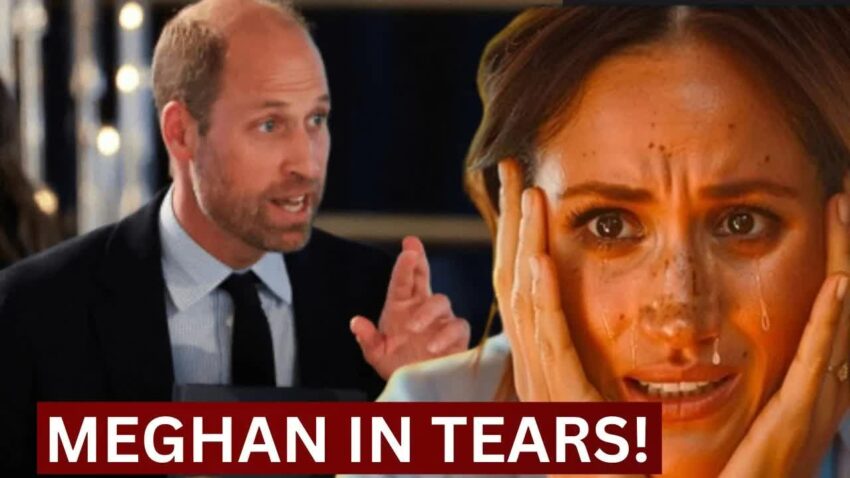In a world where royal intrigue often captures our attention, the latest antics of Prince William and Prince Harry have reignited discussions among royal watchers.
Recently, Prince William was spotted at Pecan Barracks in Wiltshire, engaging with children and showcasing the genuine compassion that has become synonymous with his royal duties.
This is exactly the kind of behavior we expect from someone poised to be the future king, embodying a sense of responsibility and dedication.
However, on the very same day, Prince Harry decided to make his presence felt at a virtual event for Scotty’s Little Soldiers.
While the cause is indeed commendable, the timing raises eyebrows.
With 365 days in a year, why did Harry choose to appear on the same day as William?
For those who have been following the royal family closely, this feels like an all-too-familiar pattern of calculated moves designed to attract attention.
The Sussex camp has often been accused of stealing the spotlight, and this incident feels reminiscent of that friend who can’t help but announce their engagement during someone else’s wedding.
It’s a classic case of sibling rivalry playing out on a grand stage, and it’s hard not to notice the similarities with past events.
Remember when Harry made headlines during the NATO summit while William was busy with his Earthshot initiative in South Africa?
Coincidence?
Doubtful.
Then there’s the matter of polo.
William has a long-standing connection to the sport, which is part of his heritage.
In contrast, Harry attempted to capitalize on polo through a Netflix series that flopped spectacularly, earning a dismal 1.9 rating on IMDb.
Watching him try to replicate something authentic while missing the essence is akin to a poor imitation artist failing to capture the original’s brilliance.
What stands out here is a troubling pattern that seems to emerge every time William takes center stage.
During King Charles and Queen Camilla’s visit to Australia, Harry and Meghan were conspicuously quiet, but as soon as William shines, Harry reappears, vying for attention like a child in a candy store.
This constant need for the limelight raises questions about Harry’s self-identity and his ability to carve out a distinct path separate from his brother.
As Harry gears up for legal battles against the media in January, one can’t help but notice how closely his actions mirror those of William.
It appears he struggles to establish his own identity without constantly comparing himself to his brother.
This behavior transcends mere sibling rivalry; it hints at a deeper identity crisis being played out publicly.
The implications of this rivalry extend beyond the brothers themselves.
While William is reinforcing the royal family’s dignity, Harry’s antics seem to undermine it.
It’s as if he has forgotten—or perhaps never grasped—the true meaning of royalty, which is rooted in service rather than self-promotion.
This behavior can detract from important charitable causes, overshadowing the very missions they aim to support.
The stark contrast between the brothers’ approaches to their royal duties speaks volumes.
William’s hands-on engagement reflects a commitment to making a meaningful impact, while Harry’s virtual appearances come off as reactive and lacking substance.
It’s almost as if Harry has become disconnected from the essence of royal work, opting instead for a strategy that prioritizes headlines over genuine involvement.
Moreover, the public’s reaction to these events is telling.
Many are no longer fooled by what they perceive as transparent attempts at garnering attention.
As they witness the contrasting styles of the brothers, it becomes clear that authenticity resonates more than publicity stunts.
If Harry and Meghan truly wished to distance themselves from royal drama, wouldn’t they avoid competing engagements?
As we approach the holiday season—a time typically associated with family unity—Harry’s actions suggest a reluctance to mend familial rifts.
Instead, he appears fixated on overshadowing William, further complicating their relationship.
This ongoing cycle of competition and reaction raises concerns about the future of the monarchy and the legacy both brothers will leave behind.
Ultimately, Harry’s recent choices reflect a missed opportunity to forge an independent path.
He could have used his platform to support his cause without resorting to overshadowing his brother.
The predictable nature of these incidents suggests that as long as William continues to excel in his royal duties, Harry may remain trapped in a cycle of attention-seeking behavior.
In the grander scheme of things, this rivalry is not just about two brothers but also about the future of the monarchy.
As William exemplifies stability and service, Harry’s actions risk portraying a cautionary tale of how not to navigate family dynamics and personal growth.
The royal family stands at a crossroads, and the choices made today will undoubtedly shape its trajectory for years to come.
